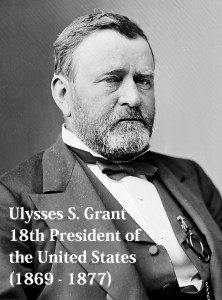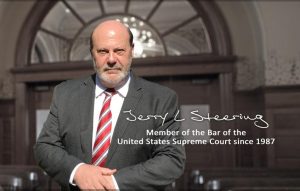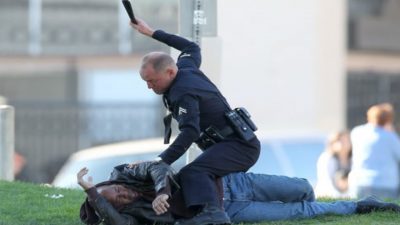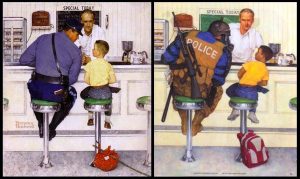![Photo of Jerry L. Steering standing in courtroom]() Suing the Police for Violating Your Federal Constitutional Rights.
Suing the Police for Violating Your Federal Constitutional Rights.
Jerry L. Steering is a civil rights lawyer who sues police officers under the federal statute to vindicate your federal constitutional rights, 42 U.S.C. § 1983, literally, almost every day. Almost every one of Mr. Steering’s civil rights cases involve allegations that some police officer or deputy sheriff violated his client’s federal rights. If the police violate your federal constitutional rights Section 1983 Mr. Steering may be able to help you sue the police “
42 U.S.C. § 1983, the Ku Klux Klan Act of 1871.
The Ku Klux Klan Act of 1871“; 42 U.S.C. § 1983, was a Reconstruction Era Law enacted by Congress to enforce the mandates of the Fourteenth Amendment and its guarantee that the protections of the federal constitution apply to persons of African descent, as well as white persons. Today we use this statute to sue the police for anything from a false arrest to a wrongful use of force by the police, to malicious criminal prosecutions, to free speech retaliation cases.
In the years after the Civil War, the South began to see the emergence of white terrorist groups. These organizations of composed mostly of veterans still aspiring to the goals of the Confederacy and their own Southern heritage, brought terror to freed blacks who looked to participate in the community as well as to their white allies.
 The Ku Klux Klan Act of 1871 was Congress’ attempt to put an end to the policies of terrorism, intimidation, and violence that the Klan, the Knights of the White Camelia, and the Jayhawkers had been using. The law unfortunately failed to eradicate the Klan or abolish the continued use of fear tactics and brutality against blacks and supportive whites.
The Ku Klux Klan Act of 1871 was Congress’ attempt to put an end to the policies of terrorism, intimidation, and violence that the Klan, the Knights of the White Camelia, and the Jayhawkers had been using. The law unfortunately failed to eradicate the Klan or abolish the continued use of fear tactics and brutality against blacks and supportive whites.
Founded as a fraternal organization by Confederate veterans in Pulaski, Tennessee, in 1866, the Ku Klux Klan soon became a paramilitary group devoted to the overthrow of Republican governments in the South and the reassertion of white supremacy. Through murder, kidnapping, and violent intimidation, Klansmen sought to secure Democratic victories in elections by attacking black voters and, less frequently, white Republican leaders.
On April 20, 1971, the United States Congress enacted “An Act to enforce the Provisions of the Fourteenth Amendment to the Constitution of the United States, and for other Purposes.” This statute was a Reconstruction Era Law enacted by Congress to enforce the Fourteenth Amendment’s guarantee that the protections of the federal constitution apply to persons of African descent, as well as white persons. Whereas the 13th amendment abolished slavery, the 14th and amendment was needed to guarantee that persons of African descent were, in fact, recognized as citizens by the states; all of the states. The 14th amendment, however, is only a collection of words, unless the enforcement mechanism for those were was created the words of the 14th amendment were just that; words.
In response to Klan violence, Congress passed the first of “three Enforcement Acts” on May 31, 1870, to ensure that the provisions of the Fourteenth and Fifteenth Amendments were followed. The act, which made it a federal offense to attempt to deprive anyone of his civil rights, had little effect on the deteriorating situation. A second Enforcement Act, passed on February 28, 1871, established federal supervision over elections, but also did little to remedy the situation. After the failure in the House of a more powerful bill that would have given the federal government additional power to enforce election law, President Grant decided to intervene. The President met with Congressional leaders to urge the passage of stronger legislation, and on their recommendation, Grant issued a direct appeal to Congress requesting a new law. Grant’s appeal was successful, and Congress passed the Ku Klux Klan Act.
Also known as the “Third Enforcement Act”, the bill was a controversial expansion of federal authority, designed to give the federal government additional power to protect voters. The act established penalties in the form of fines and jail time for attempts to deprive citizens of equal protection under the laws and gave the President the authority to use federal troops and suspend the writ of habeas corpus in ensuring that civil rights were upheld.
 President Grant put the new legislation to work after several Klan incidents in May. He sent additional troops to the South and suspended the writ of habeas corpus in nine counties in South Carolina. Aided by Attorney General Amos T. Akermen and the newly created Department of Justice, extensive work was done to prosecute the Klan. While relatively few convictions were obtained, the new legislation helped to suppress Klan activities and ensure a greater degree of fairness in the election of 1872.
President Grant put the new legislation to work after several Klan incidents in May. He sent additional troops to the South and suspended the writ of habeas corpus in nine counties in South Carolina. Aided by Attorney General Amos T. Akermen and the newly created Department of Justice, extensive work was done to prosecute the Klan. While relatively few convictions were obtained, the new legislation helped to suppress Klan activities and ensure a greater degree of fairness in the election of 1872.
42 U.S.C. § 1983, provides:
“Every person who, under color of any statute, ordinance, regulation, custom, or usage, of any State or Territory or the District of Columbia, subjects, or causes to be subjected, any citizen of the United States or other person within the jurisdiction thereof to the deprivation of any rights, privileges, or immunities secured by the Constitution and laws, shall be liable to the party injured in an action at law, suit in equity, or other proper proceeding for redress, except that in any action brought against a judicial officer for an act or omission taken in such officer’s judicial capacity, injunctive relief shall not be granted unless a declaratory decree was violated or declaratory relief was unavailable. For the purposes of this section, any Act of Congress applicable exclusively to the District of Columbia shall be considered to be a statute of the District of Columbia.”
Whereas the 13th Amendment abolished slavery, the 14th Amendment was that constitutional provision that enabled Congress to eventually make those provisions of the Bill of Rights obligatory on the states. The 14th amendment was needed to guarantee that persons of African descent were, in fact, citizens. Section 5 of the 14th amendment provided the very jurisdiction for Congress to provide a federal civil remedy for the violation of any person’s constitutional rights, by one acting under the color of state law; the “appropriate legislation” to enforce the 14th amendment.
SECTION 1983 CASES IN THE MODERN ERA; OUR REMEDY FOR CONSTITUTIONAL VIOLATIONS BY STATE AND LOCAL OFFICIALS.
Section 1983 is not itself a source of substantive Constitutional rights, but merely provides a method for vindicating federal rights conferred in the federal Constitution itself. Graham v. Connor, 490 U.S. 386, 393-94 (1989.) In other words, Section 1983 is a federal statute that doesn’t define any Constitutional rights, but merely provides a civil remedy for persons whose federal Constitutional rights have been violated. So, when the policeman falsely arrests you, you can sue the cop under 42 U.S.C. § 1983 for violation of your federal Constitutional rights under the Fourth Amendment, as being the victim of an unreasonable seizure of your person. So, when the policeman beats-you-up for telling him that you know your rights and he has no right to search your car, you can sue him under 42 U.S.C. § 1983 for violation of your federal Constitutional rights under the Fourth Amendment for an unreasonable seizure of your person under the Fourth Amendment to the United States Constitution, and, for violation of your First Amendment right to free speech / right to petition government for redress of grievances, for retaliating against you for your right to protest police actions. Duran v. City of Douglas, 904 F.2d 1372 (9th Cir. 1990.)
If you believe that a government official, including police officers, violated your Constitutional rights, please contact us about your case.
WHAT YOU CAN DO.
Someone has to stand-up to the bullies of society, who think that using state police power to humiliate others, is funny, and makes them big men (or women.) There are thousands of others like you, who are good people, and have been somehow, for some reason that you could not have ever imagined, victimized by the government. It might as well be you. Stand-up for justice. Stand-up for our form of self-government. Stand-up for the spilled-blood of our fathers, who bravery died to prevent the very thing, that the government is doing to you right now.
Click on “Home”, above, or the other pages shown, for the information or assistance that we can provide for you. If you need to speak with a lawyer about your particular legal situation, please call the Law Offices of Jerry L. Steering for a free telephone consultation. Also, if you have been the victim of a False Arrest or Excessive Force by a police officer, check our Section, above, entitled: “What To Do If You Have Been Beaten-Up Or False Arrested By The Police“.
Thank you, and best of luck, whatever your needs.
Jerry L. Steering, Esq.
Published: 2/5/2019

 Suing the Police for Violating Your Federal Constitutional Rights.
Suing the Police for Violating Your Federal Constitutional Rights.




